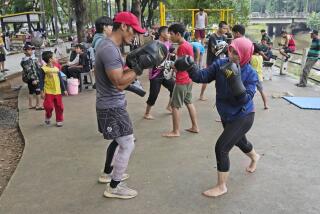Terrorized Ethnic Chinese Still on Edge in Indonesia
- Share via
JAKARTA, Indonesia — Bun Kok’s shop stands amid the skeletons of burned-out buildings in Chinatown, but despite his fears he has returned to reclaim his livelihood, selling goat horns, swallows’ nests, dried snakes and a variety of other traditional medicines.
“Rumors, there are so many rumors,” said Bun Kok, 48. “But when you’re Chinese, you stay alert to rumors. At the first sign of trouble, I close my shop and go home and lock the door.”
“I don’t wait for trouble,” said one of his customers, Lisa, 31. “I’m off the streets and home every night by 7. We’re all scared. We were the targets in the 1960s. We were targets in May. We’re always the target because we’re Chinese.”
Four months after riots claimed 1,200 lives--and generally targeted the shops and property of Chinese merchants--Indonesia’s ethnic Chinese citizens remain on edge, questioning whether they have a future in a country many have called home for two or more generations.
Some have voted with their feet. Of the 30,000 ethnic Chinese who fled Indonesia during rioting sparked by the nation’s economic crisis, thousands have not returned.
“I don’t see that [President B.J.] Habibie has done anything significant to indicate he’s working toward racial healing,” homemaker Rika Agustina, 39, said. “The feeling against the Chinese still runs deep. The May riot is as fresh in everyone’s mind as if it happened yesterday.”
What most shocked many Indonesians was the report by human-rights groups that 168 Chinese women had been victims of organized rape in the riots, and that 20 of them had died as a result or committed suicide.
Habibie called the rapes “barbaric” but also made comments that reflected little sensitivity to the fears of the Chinese community.
News of the rape report spread rapidly on the Internet and caused a worldwide uproar. Rallies were held from Boston to Vancouver, Beijing to Manila, with demonstrators holding signs that called Jakarta “the rape capital of the world.”
Taiwan suspended plans to give Indonesia 200,000 tons of rice.
Senior police and government officials responded to the outcry by saying there was no evidence to support the claims. Even if some rapes had occurred during the riots, they said, the numbers were exaggerated and the attacks were not organized.
“Not only was the government extremely slow to react to the rapes,” said Julia Suryakusuma, a non-Chinese feminist and writer, “it was also guilty of gross insensitivity expressed in the initial statements of a number of ministers. In a sense they said, because there is no proof, the rapes are merely rumors.”
In a poll conducted by the Far Eastern Economic Review and CNBC Asia, less than 3% of Asian business executives believed Indonesia’s claim that there had been no rapes. More than 75% said Asian countries should offer asylum to Indonesian Chinese; seven in 10 said they would be less likely to invest in Indonesia because of the charges.
In July, Habibie set up a commission to investigate the riots, including the rapes. Its 19 members, who are scheduled to complete their investigation Oct. 23, include independent human-rights activists, government officials and high-ranking soldiers.
The commission’s respected chairman, attorney Marzuki Darusman, said recently that his investigators had received “genuine help and cooperation from the army.”
He also stated for the record that the 168 rapes did occur. None of the alleged victims have spoken out publicly about their ordeal, but many have confided to commission investigators, Marzuki said.
In the mid-1960s, in a rampage brought to the world’s attention in the film “The Year of Living Dangerously,” ethnic Chinese were viewed as the tools for spreading communism. Hundreds of thousands were hunted down and killed.
Since then, every time there has been social unrest in Indonesia, it is usually the Chinese who are targets, although in the May riots hundreds of non-Chinese died.
The reason most often given for the mistreatment of the Chinese is envy: They represent less than 4% of the population but hold about 70% of the nation’s wealth. They also control the distribution of rice.
Their flight abroad--with the capital--after the May riots has greatly diminished Indonesia’s hopes of making an economic recovery.
Although Chinese businessmen control 170 conglomerates, the Indonesian population as a whole overlooks the fact that Bun Kok is more typical of the Chinese community than is some billionaire entrepreneur.
Bun Kok is one of 250,000 Chinese the government identifies as small businessmen and even if he wanted to, he does not have the money to take his wife and four children abroad to start again.
“My family is second-generation Indonesian,” he said. “Where would I go? This is my home even though I am made to feel not very welcome.”
More to Read
Sign up for Essential California
The most important California stories and recommendations in your inbox every morning.
You may occasionally receive promotional content from the Los Angeles Times.













